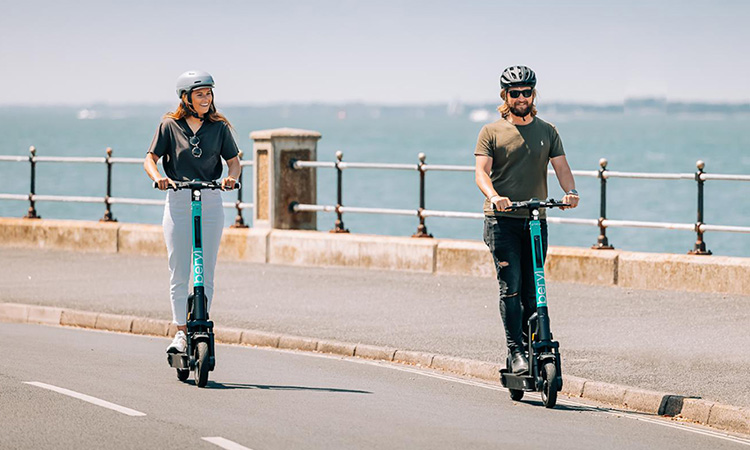Boosting service provision through innovation with Social Digital Twin
- Like
- Digg
- Del
- Tumblr
- VKontakte
- Buffer
- Love This
- Odnoklassniki
- Meneame
- Blogger
- Amazon
- Yahoo Mail
- Gmail
- AOL
- Newsvine
- HackerNews
- Evernote
- MySpace
- Mail.ru
- Viadeo
- Line
- Comments
- Yummly
- SMS
- Viber
- Telegram
- Subscribe
- Skype
- Facebook Messenger
- Kakao
- LiveJournal
- Yammer
- Edgar
- Fintel
- Mix
- Instapaper
- Copy Link
Posted: 22 August 2023 | Sacha Manson-Smith - Beryl | No comments yet
Sacha Manson-Smith, Chief Technology Officer at Beryl, provides insight into the ground-breaking potential of the company’s Social Digital Twin project and its transformative impact on sustainable urban mobility.


Credit: Beryl
Shared sustainable transport expert Beryl has launched an innovative new research project in partnership with global tech and business solutions firm, Fujitsu.
Running over the summer months of 2023, the Social Digital Twin project is designed to improve the efficiency and sustainability of the Isle of Wight’s shared e-scooter scheme. This will not only deliver operational benefits and improve the customer experience, but it will also have a much wider impact on transport planning and local economies.
Beryl’s Chief Technology Officer, Sacha Manson-Smith, has spent 25 years developing and overseeing industry-leading software systems across the micro-mobility, investment banking and pharmaceutical sectors, and is overseeing the project from a Beryl perspective.
Here, he explains a bit more about the project and what it hopes to achieve.
Social Digital Twin: Boosting service provision through innovation
The work underway will provide us with even higher levels of forecasting accuracy and will help to predict how changes in human behaviour interact with evolving conditions in the environment”
It’s really exciting for us to be working alongside an industry leader such as Fujitsu, and it’s going to be fascinating to see the results of digital rehearsal on shared micro-mobility.
On a basic level, we’re hoping that the work underway will provide us with even higher levels of forecasting accuracy and will help to predict how changes in human behaviour interact with evolving conditions in the environment.
The first test simulations using Social Digital Twin were run on the Isle of Wight in May 2023, and we’re currently underway with the more comprehensive programme, which is running over the summer months of 2023.


Credit: Beryl
How does it work?
Social Digital Twin is a new technology, which combines behavioural economics models and artificial intelligence (AI) to generate simulations that mirror the behaviour of people in the real world. It fits into the concept of Society 5.0, whereby technologies and innovations such as Big Data and simulation converge to provide a better quality of life for human beings.
According to the so-called ‘prospect theory’ in behavioural economics, individuals tend to overestimate potential losses while underestimating the probability of an event occurring. Fujitsu has developed a selection model for human behaviour that takes this kind of behaviour into account, training an AI model with characteristics of indirect factors that influence human behaviour, including weather conditions as well as other individual variables.
By combining these models with digital twins – highly accurate digital re-productions of physical objects and entities, sometimes entire cities – the new technology makes it possible for city planners and businesses, such as Beryl, to more accurately predict how changes in human behaviour interact with evolving conditions in the environment. This extra knowledge better informs decision-making.
Benefiting people
Feedback from users tells us that almost a quarter of those journeys have replaced private road transport journeys, including driving and/ or being a passenger in a car, van, taxi or motorbike”
At Beryl, we deliver sustainable transport schemes, which are specifically tailored towards towns and cities to make them better environments for people to live in. They do this by cutting traffic congestion and carbon emissions to improve air quality. We also help to make it easier for people to get more active, which helps to boost public health and wellbeing.
We do this by providing a fun, convenient, easy to use and cost-effective alternative to private vehicle ownership and, by doing so, have generated millions of sustainable journeys across the UK over the last few years.
Run in partnership with the Isle of Wight Council, our e-scooter scheme on the island is one of a number of Department for Transport (DfT) sanctioned trials that are currently being run across the UK. It launched on 12 November 2020 and, since then, has generated over 139,000 journeys across more than 440,000km.
Feedback from users tells us that almost a quarter of those journeys have replaced private road transport journeys, including driving and/ or being a passenger in a car, van, taxi or motorbike. According to industry calculations, that has saved approximately 23.5 tonnes of harmful CO2 emissions from entering the atmosphere.
This project will help us to accurately forecast the impact of changing conditions on people’s user habits, which we can use to improve the scheme by increasing vehicle availability at the most used parking bays – boosting the convenience to users.
It will also help us to more accurately estimate how far measures – including incentives such as free minutes for users who return e-scooters to specific places – will affect people’s behaviour regarding their choice of transport.
Ultimately, this will help us to deliver even more efficient schemes that encourage an even greater modal shift and further reduce the damaging environmental and social effects of car use.


Credit: Beryl
The wider impact: Planning and operations
At Beryl, we constantly strive to reduce our impact on the planet, not only by providing sustainable travel solutions, but also in our day-to-day work and our processes.
We recently achieved the ISO 14001 environmental management standard, an internationally agreed and recognised standard for Environmental Management Systems (EMS) used by organisations to help identify, manage, monitor and control environmental processes. Achieving the standard requires us to assess environmental issues relevant to our operations, such as waste management, resource use and efficiency. To gain accreditation, we have developed our existing environmental practices into a full-scale management system.
This success follows the successful validation of the company’s sustainability targets by the Science Based Targets initiative (SBTi) in 2022, alongside our re-certification as a B-Corp organisation.
The Social Digital Twin project can also help us in this aspect by identifying ways to further improve efficiencies in our own operations. For example, the technology will be able to more accurately predict how changes to transportation will affect operating costs.
The data obtained will also help our local authority partners to accurately inform future transport planning, boost the wider economy and ensure that sustainable transport becomes indispensable to integrated urban schemes.
The bigger picture
The trial is part of a wider initiative which Fujitsu is taking as a Lead Technical Partner for the UK’s National Digital Twin Programme with the Department for Business and Trade.
It aims to develop techniques to use connected Digital Twin models to benefit society, the economy, business and the environment, supported by HM Treasury. The programme is running a demonstrator in Isle of Wight, which is a fundamental element of the socio-technical change aspects of the programme.
Moving forward, Fujitsu plans to leverage the results of this project to support the sustainability transformation of mobility service providers. Its aim is to contribute to the realisation of a sustainable, fair and diverse society through converging technologies that combine computer sciences with knowledge from the humanities and social sciences.


Related topics
Accessibility, Artificial Intelligence, Micro-mobility, Mobility Services, On-Demand Transport
Related modes
Bikes & Scooters
Related cities
Isle of Wight
Related countries
United Kingdom
Related organisations
Beryl, Department for Business and Trade, Department for Transport (DfT), Fujitsu, HM Treasury, Isle of Wight Council
Related people
Sacha Manson-Smith








